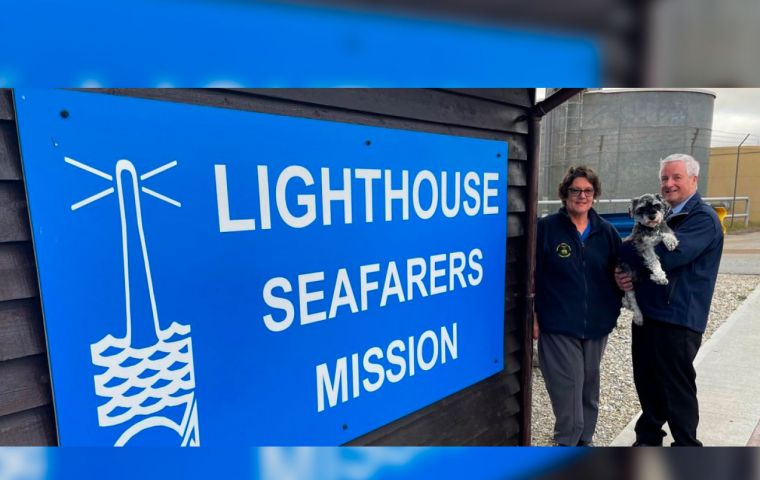MercoPress. South Atlantic News Agency
Falkland Islands Lighthouse Seafarers Mission, a jewel in the South Atlantic, and the sustainability challenge
 There is no doubt of the tireless care and commitment of Maurice and Debbie Lake, it is not a job but a vocation.
There is no doubt of the tireless care and commitment of Maurice and Debbie Lake, it is not a job but a vocation. Celebrating its 25th anniversary in 2022, the Lighthouse Seafarers Mission in Port Stanley is a focal point and necessary ground zero for onshore welfare support for seafarers in the Falklands. However, the Mission is also working with the Falklands fishing companies and the Islands' government somehow to ensure sustainability and development through a funding mechanism.
There is no doubt of the tireless care and commitment of Maurice and Debbie Lake, and Leeann Harris in the daily servicing, running and future development of the Mission. It is not a job but a vocation.
An established hub of not just the seafaring and fishing community but the wider island community, this safe space provides a critical charitable service which is unique and, as such, must be commended for its enduring success.
“We are a necessity for respite care,” said Maurice Lake, the Port Chaplain, as Human Rights at Sea CEO David Hammond joined him, his wife Debbie and the infamous attentive 'Marlon', their Miniature Schnauzer, for a discussion around running such key organizations.
Unsurprisingly, Marlon is a key asset in providing mental well-being support to those who come through the front door. The benefit of animal interaction during respite care is well-documented.
Services and Future
During the COVID pandemic, the staff worked for 11 months without a break, seven days a week. Until August 2022, one member of staff had worked full-time without pay, which is remarkable considering the levels of commitment being unreservedly given.
Today, the Mission's team provides 24/7/365 access, short-notice accommodation with three bedrooms and five beds, and individual and group support for both simple and complex issues ranging from Wi-Fi access, spare clothing, washing facilities and assistance with medications, by way of example.
The legacy of COVID has otherwise positively highlighted the real needs of such spaces.
In an ideal world, there would be 10 ensuite rooms with single occupancy and no bunk beds, which may increase occupancy levels on paper but may not be good for seafarers with broken limbs or recovering injuries that often require a degree of privacy to convalesce.
As Debbie succinctly framed it, “We care for all of seafarers' needs”.
She further commented that: “Such needs are far-reaching. The obvious ones being when they are sick or injured and recuperating, recognizing that needs can go beyond the physical into emotional needs. Their families are also affected in such cases, and it is vital to recognize and tend to any, and all, of their issues”.
One of the Mission's biggest steps forward was to provide free internet for seafarers. Having stood out amongst the few Seafarer's Missions worldwide who were unable to initially offer this provision, from June 2021 onwards, the Mission was able to step up its capability in providing such essential communication facilities.
To sum up, the Port Stanley Lighthouse Seafarers Mission is an impressive welfare operation, one which requires assured sustainability and development for the next 25 years.
A Sustainability Solution?
In 2020, Human Rights at Sea, working alongside the then New Zealand Seafarer Welfare Board, instigated an amendment to primary legislation of the 1994 Maritime Transport Act. This allowed for the requirement by 2024 to use a small portion of government levy funding from visiting vessels to consistently fund onshore welfare facilities.
This precedent and potential funding model may be the key to unlocking the perpetual issue of funding for welfare organizations globally. It will simply require, in law, the assured long-term sustainable funding of onshore facilities. Therefore, it will balance the requirements of the coastal state with commercial interests and civil society needs.
It will further fulfil the corporate social responsibility and ESG (environmental, social and governance) requirements for commercial entities in their formal reporting to Boards and shareholders.
In short, maritime levy funding through a coastal state government is a win-win solution.
In the local context, and as Maurice highlights: ”The Mission has been working with the Falklands Islands Fishing Companies Association (FIFCA) over a number of years, and it is hoped that by July 2023, through an Accord between FIFCA and the Falklands Island Government, that the Mission will shortly have sustainability in its funding.”
If achieved, the Falkland Islands Government will set a Southern Hemisphere onshore welfare funding mechanism precedent to match that of the emerging New Zealand model.
About: The object of the Mission is to support visiting seafarers of all nationalities, as well as seafarers residing in the Falkland Islands. The Mission particularly aims at assisting those who are in conditions of need, hardship or distress as a result of local, national or international disaster or by reason of their social and economic circumstances. https://lighthouse.org.fk/ Contact: LIGHTHOUSE SEAFARERS MISSION, FIPASS, Stanley, Falkland Islands, FIQQ 1ZZ; E: lighthouse@horizon.co.fk


Top Comments
Disclaimer & comment rulesCommenting for this story is now closed.
If you have a Facebook account, become a fan and comment on our Facebook Page!